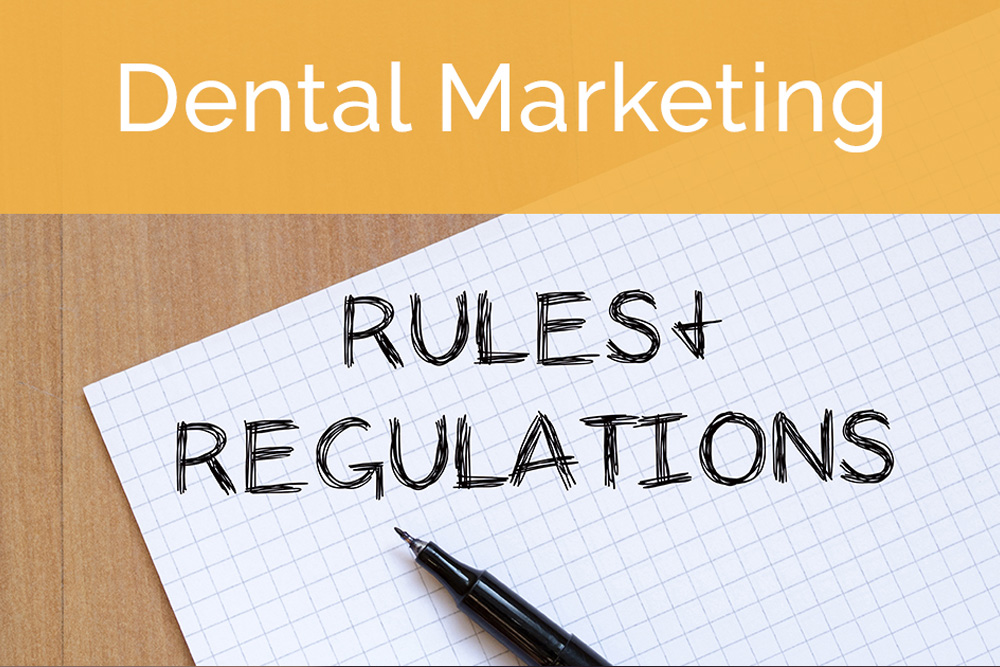The Rules and Regulations of Dental Marketing
You don’t have to be a technology nerd to be enthusiastic about all the ways marketing has advanced in recent years. There are new tools and platforms developed every day designed to help a business find its audience, and ultimately, its success.
This is true as well for dental marketing, however the commonly accepted rules established by the Federal Trade Commission (FTC) on truth in advertising are just some of the necessary regulations for the healthcare industry as a whole. Modern-day marketing tools such as social media and Yelp reviews add a whole new layer to the safeguards required for ethical business practices.
The American Dental Association (ADA) offers clear guidance on the professional standards of conduct and ethics in dental marketing, including advertising basics for dentists and dental associations. The following are some of the key factors to consider when promoting your practice that will keep you in good standing with the FTC, the ADA, and most importantly, your patients.
The Truth and Nothing but the Truth
Any dental advertisements in the U.S. must be truthful and not contain false, deceptive, or misleading claims. Promises of treatment outcomes, success rates, or the effectiveness of procedures should be substantiated by reliable scientific evidence and should not be exaggerated or misrepresented.
You may recall a famous mouthwash that used to claim it could cure colds until the 1970s when the FTC made them change their advertising to better reflect the truth. Likewise, dentists can make subjective claims like “we’re the friendly dental office,” but not “we’re the best dental practice in town.” Puffery is okay, but facts must be backed up.
Credentials & Qualifications
Similarly, dentists and dental practices must accurately represent their qualifications, credentials, and certifications in their advertising. Claims about specialized training, expertise, or experience should be verifiable and supported by relevant documentation.
Language is important in sharing special qualifications. Sedation dentists should not use the term “sleep dentistry” unless they administer general anesthesia. And all dentists should avoid the words “pain-free” in their advertising.
Patient Testimonials
Social media and business review platforms are powerful and cost-effective tools for patient acquisition and word-of-mouth referrals. The use of these patient testimonials or endorsements in your dental marketing should comply with FTC guidelines and should reflect the honest opinions, beliefs, and experiences of patients. Avoid offering freebies for your patients’ positive feedback, and if there are any material connections between the endorser and the dentist, that should be disclosed.
Consent and Privacy is Key
As with any healthcare provider, patient privacy should always be protected in dental advertising. Dentists must obtain proper written consent from patients before featuring their photographs, videos, or personal information in marketing materials. This includes before and after posts on social media or testimonials with full names on your website.
In addition to FTC guidelines, the healthcare sector must always consider HIPAA regulations to protect their patients’ legal right to privacy. This includes how you collect your marketing data. The smartest way is to keep your CRM or patient database and the marketing system separate.
Full Disclosure
When necessary, dental advertisements should include appropriate disclaimers or disclosures to ensure that consumers have all the necessary information. For example, if certain restrictions or limitations apply to a promotional offer, they should be clearly communicated.
In Closing
Following the rules in dental marketing often comes down to watching your language and protecting your patients. It’s also important to note that dental advertising regulations may vary by state, so dentists should consult the specific guidelines provided by their respective state dental boards and the ADA for comprehensive and up-to-date information in their jurisdiction.
By partnering with a firm that specializes in the dental industry, you can feel even more confident in availing yourself of all that today’s marketing advances have to offer. At RAMP, The Dentist’s Marketing Company, we have access to an experienced regulatory counsel who stays abreast of the constantly changing landscape. Contact us today for a free evaluation!
